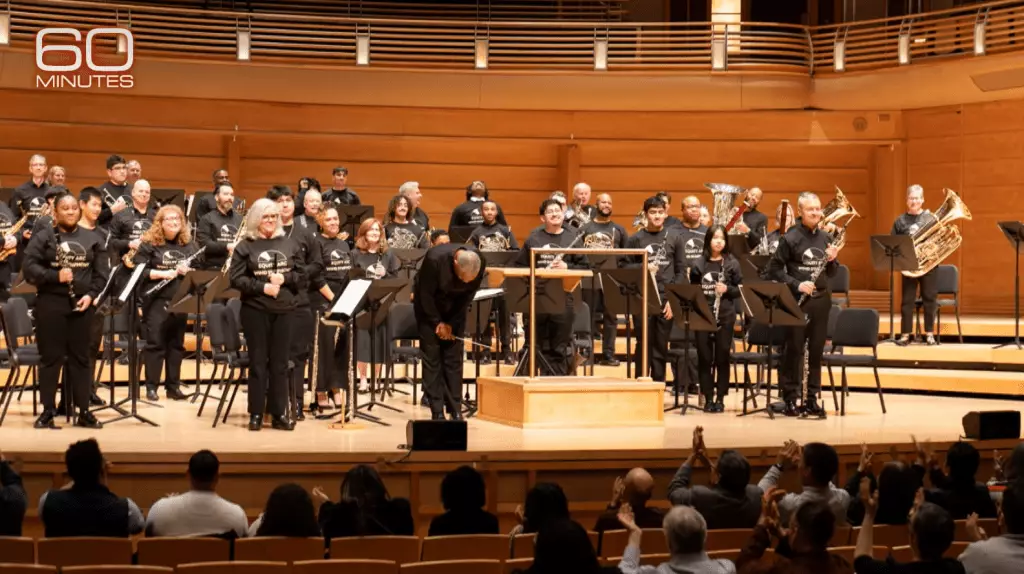In a profound exploration of societal values, CBS’s acclaimed news program “60 Minutes” recently shone a glaring spotlight on the ramifications of government policies targeting diversity, equity, and inclusion (DEI). The program zeroed in on a poignant case involving young musicians of color who were unable to perform alongside the United States Marine Band—a symbolic institution of military pride and American unity—due to an executive order imposed during the Trump administration. This decision does not merely represent a legal mandate; it speaks volumes about the cultural landscape that seeks to marginalize voices that do not conform to a historically white narrative. The action to sever ties with a young ensemble offers a microcosm of the larger, detrimental trend affecting minority communities: the silencing of expression under the guise of policy reform.
A Treasured Opportunity Denied
The Marine Band, often referred to as “The President’s Own,” has a rich history dating back to 1798 and serves as a bastion of musical talent and patriotism. Last year, the band took a commendable step towards inclusivity by collaborating with Equity Arc, a nonprofit aimed at uplifting young musicians from diverse backgrounds. The goal was to allow a select group of Black, Hispanic, Indian, and Asian youths to share the stage with seasoned performers, thereby creating a cultural bridge that highlights the importance of diverse representation in the arts. However, the hopes of these talented individuals were dashed when the executive order prohibited such initiatives, leaving them without the opportunity to showcase their gifts.
Rishab Jain, an 18-year-old Indian American and one of the selected musicians, articulated a profound sentiment: “If we’re suppressing music, we’re suppressing emotions… we’re suppressing the very essence of what makes us human.” His words resonate deeply in a time when America grapples with its identity and the values it holds dear. They challenge us to consider the extent to which art serves not just as entertainment, but as a vital expression of human experience that fosters understanding and empathy among diverse groups.
Resistance Through Art: A Concert of Dissent
In an act of solidarity and defiance, “60 Minutes” chose to stage its own concert, bringing together the very artists who were silenced and retired musicians from esteemed military bands. The performance, organized by Equity Arc at a rented concert hall, became a rallying cry for inclusivity, diversity, and the unyielding belief that every voice matters in the fabric of America. Conducted by Rodney Dorsey, the concert featured the young musicians performing Shostakovich’s “Gallop,” a piece imbued with emotion and dynamism.
Retired trumpet player John Abbracciamento’s resounding statement, “It brings out the best of us,” encapsulates the essence of artistic collaboration. By transcending barriers and joining together, artists can cultivate a space where creativity flourishes and diverse stories are told. Such a concert not only serves as a challenge to ill-informed policies but also as a reminder of the unifying power of art.
The Broader Implications on Society
America’s collective cultural identity is at a crossroads. With orchestras across the nation remaining predominantly white—an alarming statistic that showcases a lack of representation in one of the country’s most revered art forms—it is imperative to recognize the importance of including voices from diverse backgrounds. The threat posed by the executive order goes beyond a single performance; it encapsulates a broader narrative of exclusion that impacts the integrity of artistic expression in America.
In this age of growing polarization, the act of stifling artistic endeavors serves as a litmus test for our values as a nation. Whether through music, visual arts, or literature, the suppression of artistic voices not only devalues those individuals but also impoverishes society as a whole. The young musicians whose opportunities were curtailed by this executive order remind us all that creativity and the arts must be safeguarded against political whims. Their stories challenge us to engage actively in the fight for inclusivity, pushing back against the forces that seek to silence diversity in any form.
The commitment of organizations like Equity Arc and the resolve demonstrated in concerts like the one produced by “60 Minutes” underscore the urgent need to advocate for change. By amplifying the voices of artists from every demographic, we nourish an environment that celebrates the richness of the human experience, essential for a vibrant democracy. The refusal to accept a singular narrative not only strengthens our cultural vocabulary but also fosters a sense of unity amidst diversity—an ideal worth striving for.
